
|
|
In Memory's Eye (Part 3) John Ward Honourable Members
A tall, gaunt man, he was an elder statesman of the party who had watched it swim and sink, rise and fall, in his many years as observer and counsellor prior to seeking a public role in politics. Born in 1884, he was 76 years of age when I first laid eyes on him, sitting in the front row on the government side of the House of Commons, and close to the Speaker's Chair. This meant he was a goodly distance from the Hansard reporters' desk, and at a time when the Chamber lacked a satisfactory sound amplification system his soft tones were scarcely audible to them. He enjoyed a reputation that placed him above the usual fray between Opposition and Government. He was trusted as a man who stood on principle, and who acted on principle. Having been appointed a Minister without Portfolio by Diefenbaker in 1957, he resigned from the Cabinet two years later in 1959, and was content to serve as a simple Member from that day onwards. Macdonnell was a vetaran of the First World War in which he achieved the rank of Brigadier-Major in the Canadian Field Artillery, and among the decorations he won were the Military Cross and the French Croix de Guerre. The Canada he served has undergone great change since he died in 1973, but his legacy of valour, honour, conscience and honour remains as an ideal others might seek to emulate.
In addition to his constituency duties, Heath Macquarrie became an unofficial ambassador for the islands of the West Indies and propagandist for their leading export in spirits, rum. Each year he hosted a party on the Hill at which he extolled its quality. In Opposition his leading role was that of PC critic for the Post Office. Postal services were a regular item of complaint, especially during the years when strikes were staged by unions representing the workers. A feature of parliamentary debate was the "Late Show", which took place usually between 10 and 10.30 p.m. If a matter was of sufficient gravity, and a Member thought he had not received a full and satisfactory answer to questions he had asked earlier in the day during the regular Question Period, he could seek permission from the Speaker to raise the subject of his questions during that evening's Late Show. Came the day that Macquarrie was the beneficiary of one such permission. Under the rules he was granted seven minutes to voice his concerns, and the Minister had three minutes in which to reply. Normally during the Late Show the Chamber was deserted, save for the one, two or three Members with issues to raise, and a like number of Ministers, or their stand-ins, to reply. To Macquarrie's chagrin, Kierans rose from his seat and disappeared from view behind the back row curtains. Macquarrie believed he was insulted, and why not? There was no Minister to hear his "remarks". He thundered, his performance that of a veritable volcano, and the more he thundered the more a desk behind him was thumped in appreciation. Unnoticed, Kierans has made his way behind the curtains over to the Opposition side of the Chamber, and had taken a seat a few rows behind the now almost apoplectic Macquarrie. Encouraged by his unknown supporter, Macquarrie pulled out every stop in the organ of his oratory. When he finally ended and resumed his seat, he saw the grinning Kierans sitting behind him, who then rose, walked across the Chamber, and standing in his proper place expressed his admiration for the performance Macquarrie had just delivered. Such moments come rarely in Parliament. They help give a human face to all that happens in that august institution. Outwardly, Heath Macquarrie gave every indication that he was playing a role, and that he tailored his personality to fit the part assigned him. Inwardly, he was a much read man, with a kind heart, who cloaked his many acts of generosity from public view. Mr. Mandziuk, who represented the riding of Marquette in Manitoba, was one of the early group who entered politics in the post-war years who was proud to claim a Ukrainian backgound. He qualified to practise law, was a schoolteacher, and occupied a number of positions at the community level before being elected as a Conservative in the Diefenbaker upset defeat of the governing Liberals in 1957. His given name was Nicholas, but to me he was always Mr. Mandziuk. Perhaps as an immigrant myself I subconsciously admired the man from Marquette who first saw the light of day in 1902 in far away Ukraine. He deserves to become the subject of a well researched biography by some budding Manitoba historian or circle of students.
What I and my colleagues saw and experienced was the almost flawless sense of ease which both of them displayed in debate, in the thrust and parry of the daily Question Period, and in something more intangible, a sense that they belonged. The father, the Honourable Paul Martin, was almost sixty years old when I had my first experience of him. By then he had a lengthy curriculum vitae listed in the little red book, the Canadian Parliamentary Guide, which has cryptically recorded the entrances and exits of the country's parliamentarians year by year, and is an indispensable handbook for anyone interested in politicians, both past and present. It was during his tenure as Secretary of State for External Affairs that one of his greatest talents became evident, at least to my colleagues and me. He had a wonderful gift of obfuscation, of answering questions at length without intruding on specifics. I, at least, had encountered the type before when working on the official reporting staff in Dáil Éireann, the Irish Parliament in Dublin. Éamon de Valera, the Irish Taoiseach, was a past master of the art. It is doubtful if he and Paul Martin ever encountered each other, but each could readily recognize a fellow artist. Both rambled on, and frequently had their ramblings cut short by Speaker or Ceann Comhairle. To put it bluntly, they both tried the patience of listener and reporter as they wove their thoughts into intricate patterns of phrase, serpentine soliloquies, entering maze after maze of linguistics, until the cry of "Order" issued from on high, falling from the Speaker's lips, and forcing them to resume their seats. It was afterwards that the real work began-how to translate the heap upon heap of verbiage into sentences from which a glimmer of meaning could be extracted. I have written elsewhere of de Valera. The best summation of the Honourable Paul senior came from a colleague on Hansard, Roger White, who claimed that he had written Canada's foreign policy for months. By judicious trimming, cutting, and transplanting, he had been able to provide sense and meaning, hidden in the undergrowth of the Minister's effusions. Paul Martin senior served Canada well and capably. It was his misfortune to contest twice for leadership of his Liberal Party when new faces were thought to be the answer to ensure continued retention of power. Pearson and Trudeau were those faces. Like others of his predecessors he faded into the obscurity of the Senate, only to be rescued and appointed High Commissioner to Britain in 1975, then the highest post in the Canadian diplomatic service, for which his talents suited him admirably. His career was full of distinctions and honours, and when he was Minister of National Health and Welfare he introduced progressive social legislation which underpins all advances made in health and social services ever since. To a future commentator must be left the story of his son's career.
Chevrier presented a much different appearance from his friend on the political stage. Where sonorous might be applied to Martin, Chevrier's manner of speaking was precise and clear-cut. Martin over time became slightly overweight. Chevrier retained a clean-cut physique. Martin, the gentleman, Chevrier the patrician, both were skillful in debate. Of especial interest was Chevrier's appointment as Canadian delegate to the Bretton Woods Conference in 1945. Mention of Bretton Woods may draw a puzzled look in 2003, but it was the foundation of international fiscal and economic policies that spurred the recovery of world trade and international finance from the dismal depths to which World War II sank them. As the Member for Stormont, Chevrier was the personification of an older generation of politics who regarded public service as a duty, not merely a part-time occupation which might pave the way to success in other endeavours. And he shared with Paul Martin a common trait. Both were the best dressed men in the Chamber of those times. Here a note of self glory must be introduced. The year was 1963. Free for six weeks in summer, I spent that time improving my skills as a shorthand reporter on assignment to various international bodies. One was the Food and Agriculture Organisation meeting in Rome. The extra pay it brought tempted me to enter a renowned men's tailoring establishment and gratify myself by ordering a custom made suit. Wearing my Italian designed, hand-tailored, dark blue silk suit, I drew a never to be forgotten compliment as I took my seat at the Hansard reporters' desk when the House resumed sitting. It came from the Officials Gallery. "There are now three well-dressed men in the House, Chevrier, Martin, and ……." False modesty forbids me naming the third! Sic transit gloria mundi. "Yukon Erik" was the lone voice of the Canadian North to retain his seat, come weal or come woe, from 1957 to 1987. And that voice was listened to, with anguish or applause, by members on both sides of the aisle in the Chamber of the Commons. Whether supporting or attacking, Nielsen was a formidable friend or implacable foe. In the arena of party politics he was the ultimate partisans' partisan. Yet for all that he spoke in mild tones, seldom raising his voice, and was that rare wonder, a parliamentarian who spoke in sentences, subject, verb, object, adjective and adverb all in their proper places. He was a delight to report and transcribe. It is from the perspective of Editor of Hansard that I came to know the influence he wielded. At a time when a new administration was brought on to the Hill by Madam Speaker Sauvé, a determined effort was being made to abolish the English Hansard reporters and replace them with recording machines. A staff vacancy occurred. And another. Sanction to recruit new reporters, who might be drawn from any of the nine English-speaking provinces and two territories, was held up. Within forty-eight hours of being informed of the situation, Erik Nielsen cut through the official balderdash, and Hansard was permitted to advertise across Canada to fill the vacancies. It is for others to spend time and resources writing the political life of the man. For present purposes it is sufficient to relate that Erik Nielsen was never "a nobody a hundred yards from Parliament Hill", as backbenchers were once described in a moment of pique by Pierre Trudeau. It was my good fortune to act as court reporter in January, 1963, at the preliminary trial held in the Yukon capital, Whitehorse, in a famous murder case which made newspaper headlines in Canada and France. Karoly Marsi, a young refugee, was admitted to Canada following the Hungarian revolt against the Russian forces occupying his country in 1956. Unfortunately he became a drifter without steady employment. In the summer of 1961 a young French visitor, the grandson of a man who had taken part in the famous Yukon gold rush, decided to retrace the route his grandfather had taken. He made it to Dawson City, had the good luck to meet someone who apparently remembered his grandfather, stayed a short while, and then began hitchhiking down the Alaska Highway on his way home. He never made it back to France, and in the spring of the following year the RCMP began an arduous, painstaking search operation, during which a small aircraft crashed killing one of the main investigators, a Corporal Absell. The scattered bones of the French visitor were eventually located, circumstantial evidence linked Marsi to his disappearance, hence the Whitehorse court case. As I was reporting in my flawless Gregg shorthand, I looked up one day to see Erik Nielsen who had dropped in to listen to part of the trial, and as the days passed I learned from townspeople just how highly they regarded him and were proud to have him as their representative. How did the story end? The case was eventually dismissed by a higher court in Vancouver. Karoly Marsi was released, and a few years later was discovered dead, hanging by the neck in a prison cell in Montreal. As if I haven't intruded enough on this tale of "Yukon Erik", the case coincided with the annual beard growing contest in Whitehorse, and I landed back in the sedate surroundings of 1960s Ottawa with a salt and pepper beard that was my pride and joy. When the House resumed sitting I had to shave it off. Beards in those times were for hippies and not acceptable to be seen on the floor of the Chamber of the House of Commons.
Flanders and Swann, Oliver and Hardy, Abbott and Costello, there are some duos of whom the mention of one name invariably calls the second to mind. That the aforesaid trio of duos were popular entertainers should not be interpreted to mean that the fourth duo, Peters and Howard, gained the limelight as parliamentary comedians in their time. Arnold Peters from Timiskaming riding in Ontario, hardrock mining country, and Frank Howard from the constituency of Skeena in British Columbia, fishing and timber country, were an odd pair who changed the way some things were done in Parliament, and changed them for its own good. There was a time, and now it seems a long time ago, when the newest province to enter Confederation, Newfoundland, had a system of laws which forced those seeking a marriage divorce to petition the Canadian Parliament, sitting in Ottawa, to grant them the dissolution they sought. It was an extraordinary procedure. Cases were initially examined by a Senate Committee, and the ritual usually involved a detective giving evidence of one party or the other being found in flagrante delicto in an hotel room. When Senators were in a hurry-sounds like a contradiction in terms-one of them was wont to hurry things along by saying to the detective giving evidence, "Come on, man. Hurry up. Get them in bed!" After the Senate exercised its sober judgment, cases were passed on to the Commons, which usually dealt with them before adjourning on Friday afternoons. Arnold Peters and Frank Howard joined forces to drag out debate on each case. Eventually the backlog of cases grew and grew. It was a classic example of justice delayed being justice denied. It was harsh on those seeking relief, so harsh that the government was forced into making arrangements for jurisdiction over divorce proceedings being transferred to the province where it should have resided in the first place. In their own way, Arnold Peters and Frank Howard were the pioneers who led the way to the day when, many years later, Justice Minister Trudeau proclaimed: "The State has no place in the bedrooms of the nation." Peters and Howard went on to refine their act when it came to passage of government estimates. When they held up business for too long, somehow word was conveyed to them that a needed wharf, bridge, or road in their ridings would receive priority attention, and debate would end. As parliamentary hold-up men their record survives as a unique lesson in obstruction for the sake of construction.
Until then it was a white man's club. The election of the first Canadian of Chinese descent to the House was that of Douglas Jung, in the riding of Vancouver Centre, in 1957. Jung brought with him excellent credentials from his career as barrister and solicitor, and as a veteran who served in the Intelligence Branch of the Canadian Army from 1943 to 1946. He was a quiet but clear speaker, a member much concerned with representing the Chinese population of Vancouver which, over the intervening years, has burgeoned into the largest ethnic group on Canada's west coast. Diefenbaker took much satisfaction from the fact that he had been attracted to the Progressive Conservative Party, as he also did from the fact that he, as Prime Minister, had appointed the first Canadian native aboriginal as a member of the Upper House, Senator James Gladstone of Lethbridge, Alberta. In passing, it may be of interest to recall that Gladstone was a member of the Blood Tribe of the Blackfoot Nation, whose name, Akay-na-muka, in English translation was "Many Guns". Prime Ministers Pearson prevailed on Trudeau and two of his friends to play an active role on the national scene by becoming members of the Liberal Party and running for election to the Parliament of Canada. Trudeau, Jean Marchand, and Gerard Pelletier, dubbed "the three wise men from Québec", were duly elected, and Trudeau served in Pearson's final cabinet as Justice Minister. His debut in the Commons was inauspicious. He displayed none of the fiery oratory embraced by Marchand, a lovable man of the people. Pelletier occupied himself with promoting the use of French. Of Trudeau little was known, except by the parliamentary security staff who became accustomed to the long hours he sequestered himself in his office on Parliament Hill, often being the last at night to quit work. Suddenly he dove into public consciousness when he unveiled the results of his long nights' work, titled "A Canadian Charter of Human Rights", and made a ringing declaration that the state had no place in the bedrooms of the nation. Shortly afterwards, when he ran to succeed Pearson as leader of the Liberal Party and Prime Minister, he became the darling of the nation's mothers and their daughters, and an inspiration to teenagers of both sexes. His athleticism, his well photographed high dives into swimming pools, his vitality, physical and mental, left opponents floundering in his wake. There was a generation gap which they could not close, and Canadians opted for the new sensation from Québec. From his entry to the Commons in 1962 until his departure in 1982, I had the remarkably unique experience of observing the man in action, either from the Hansard reporters' desk on the floor of the Commons Chamber, scarcely six feet from where he sat, or from the Hansard editor's chair in the Press Gallery. Trudeau treated the Opposition with scarcely concealed disdain. And they hated it. It was more by manners and body language that he drew their ire. He was no orator, and the set speeches he read from prepared text were delivered in a droning monotone. But he revelled in the thrust and parry of the daily Question Period. His quick wittedness saw him deflect the most pointed queries, once or twice leaving opponents, including the masterful Diefenbaker, fuming in their seats. On one memorable day he didn't even have to speak to set the Opposition benches in an uproar. He mouthed an expression that would have been completely outside the bounds of good taste and parliamentary decorum had he spoken it. Later he quipped that he had merely said "fuddle duddle". He was right about the first letter "f", but the second word was "you". It is an irony that his unspoken words achieved the same status of the memorable, but completely erroneous phrase, "What's a million?" attributed to an earlier minister, C.D. Howe. For sixteen years Trudeau dominated the Commons. He took a certain pride in swimming against the current of public opinion. Decades before the disparity between rich and poor nations became a hot topic, he advised that unchecked growth in wealth and consumerism in a nation such as Canada would lead to envy and distrust among the poorer peoples of the earth. It was not a popular view then, and it still isn't popular. Trudeau was one political leader who did not court popularity, but Canada was proud to boast of having a Prime Minister who, having intellect and personal magnetism, held his own among the world leaders of his era. On a personal note, harking back to his early days in Parliament, I had kept a copy of his first major offering, the proposed "A Canadian Charter of Human Rights" among my files. When the actual Charter became law on April 17, 1982, as part of the Constitution Act 1982, signed by Her Majesty Queen Elizabeth II, and by three Ministers of the Crown from Québec, Trudeau, Jean Chrétien and André Oullet, I had sent that original copy, slightly aged by time, to him for his signature on that date. Nothing happened until January 10 1985 when it was returned to me by his office, signed as requested, with an accompanying note reading:
Trudeau had another connection with Hansard which may be viewed in the Official Report of Debates. The incident arose when he was challenged on the veracity of what he had said a day earlier in Question Period. In his reply he paid tribute to the common sense exercised by the Hansard editor. Not too many people have been accused twice in their lifetime of possessing that rare commodity, the first time by Nobel Peace Prize winner Seán MacBride, Minister for External Affairs in the Government of Ireland, in a completely different context, and the second time by a Prime Minister of Canada. Maybe they both were suffering bad hair days. On reopening that prized copy of Trudeau's "A Canadian Charter of Human Rights", something of the span of his intellectual approach is shown in Chapter I where the first name he mentions is Cicero, followed by St. Thomas Aquinas, Locke, Rousseau, and then goes on to quote what he calls "the memorable words of the American Declaration of Independence":
Among the appendices attached to his proposed charter he included the "Convention for the Protection of Human Rights and Fundamental Freedoms" signed at Rome on November 4, 1950. The person shown as signing it on behalf of the Government of the Irish Republic was none other than the aforementioned Seán MacBride! Like the salmon, King of Fish, Trudeau safely navigated the political and natural riverway rapids of Canada for many seasons before returning to die in Montreal, the headwaters of his birth place. A question remains. Was it his wry sense of humour, or his personal feeling about the role of Governor General, that lay behind his appointment, first of Edward Schreyer, Manitoba Premier and once Leader of the New Domocratic Party, and later of Jeanne Sauvé, controversial Speaker of the House of Commons, to that position? Speakers of the House
Macnaughton broke precedent in spectacular fashion when he became the first member of the Opposition in the Canadian Parliament to be chairman of the Public Accounts Committee in 1958. As a parliamentary reporter in Dáil Éireann where it was customary to have an opposition member chair that committee, here was another instance where I found Canadian practice to lag behind that of other national legislatures. Macnaughton performed his task as chairman well and satisfactorily, so satisfactorily that he entered the office of Speaker with the good wishes of all parties. When he left that office he had established himself as a Speaker who had carried out his duty fairly, quietly, and effectively.
Lamoureux had a temperament clearly suited to the job. As the years passed his standing grew in the Commons, not limited by his physical stature, he being of moderate height. And the office of Speaker rose in esteem and respect. From the standpoint, actually the seating point, of a member of the Hansard staff, he was a pleasure to report. His rulings were precise, well founded, and tempered with a human touch. And in them a pattern could be discerned. In his preambles he paid full tribute to the arguments presented in support of the case put forward by a Member, be that Member in Opposition or in Government, and thanked the Member for the care he had taken in researching precedents. Then came the ruling, and though it may have gone against the Member raising a point of order or question of privilege, that Member could take comfort in the fact that his case had been heard and fully considered. Lamoureux was a master of the art, so much so that longtime observers came to know well in advance of the actual ruling exactly how it would go. His years of experience as a backbencher may have been responsible for the respect that he paid to Members in those benches. And he was even-handed. Rulings in favour of Government members were founded on fact. Rulings in favour of Opposition members were solidly based on reason and precedent. He had a human touch. Dignity without show was his hallmark. He was accessible. When it came time for prominent members of the staff to retire he acknowledged their services, sometimes publicly when presiding over the House, sometimes privately. Of this I had personal knowledge. Warren Buskard, the Editor of Debates, retired in 1966 after serving as a Hansard reporter and officer of the House for 43 years. Not many had equalled his devotion to duty as he upheld the independence of Hansard, free from political pressure and official meddling behind scenes. In the course of time he came to be resented by newer and more ambitious officials. Came the actual day of his retirement and his Hansard colleagues waited for the customary acknowledgment from the Chair at the end of Question Period. None came. What had gone wrong? Deputed to find out, I arrived at the Speaker's Office, gained ready admission, and was told by Mr. Lamoureaux that he had no knowledge that Buskard was retiring that day. He had not been officially informed. It was a mean, vindicative act that was never forgotten. As Speaker, Lucien Lamoureux took an active interest in the well-being of staff, and acted as court of last resort whenever his assistance was sought. His entry in the Canadian Parliamentary Guide is one of the shorter ones in the list of Privy Councillors. His legacy as Speaker is a lengthy one, befitting the man and the Office. Curiously, where others with less distinguished records were granted some of the highest recognition possible, Lucien Lamoureux was accorded a minor ambassadorship on his retirement. Later he served the city of his birth in a number of volunteer capacities, most notably as Chairman of the Civic Hospital Foundation, raising funds for a most deserving cause. Years after he left public life he was asked to disclose the secret of his success as Speaker. With customary modesty he replied: "I had a strong Table". Table in this sense meant the Clerk and Assistant Clerks sitting at the table in front of the Speaker's Chair on the floor of the House, always available to advise on procedural matters. During Lamoureux's eight years and nine months as Speaker they included Leon-J Raymond, Gordon Dubroy, T. R. Montgomery, and Alex Small, ably assisted in other capacities by Dr. Maurice Ollivier, Law Clerk; Reg Boivin, Chief of French Journals, and Ed O'Connor, Chief of English Journals. [In the next segment: John Matheson, George McIlraith, Jay Waldo Monteith, George Nowlan, Pat Nowlan, John Knowles, Reynold Rapp, Jean-Thomas Richard, Dr. Rynard, Michael Starr, Lincoln Alexander, Joe Clark (Prime Minister), Jeanne Sauvé (Speaker)] --30--
Home | About | Canadian Vindicator | Literature | Gallery | History
|
||||||||||||||||||||||||||||||||||||||||||||||||||||||||||||||||||||||||||||||||||||
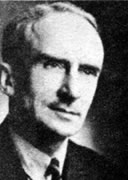 Like some dimly perceived wraith, an almost transparent shadow from an age long past, the Honourable James Macdonnell, Member for Toronto-Greenwood, was known as "the conscience of the Progressive Conservative Party" during the Diefenbaker years.
Like some dimly perceived wraith, an almost transparent shadow from an age long past, the Honourable James Macdonnell, Member for Toronto-Greenwood, was known as "the conscience of the Progressive Conservative Party" during the Diefenbaker years. 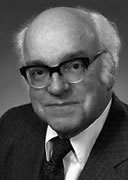 Heath Macquarrie was a man of varied parts. A long-serving Member for the riding of Queens, Prince Edward Island, he played many roles, teacher, political science professor, radio commentator on international affairs, member of many Canadian and international associations, including the Hansard Society, and Canadian delegate to the United Nations. With such a wide scope of interests he could well have aspired to Cabinet. But Prince Edward Island, with its four seats in the Commons, could not be rewarded with two Cabinet posts, and he served out his career in the Commons as a backbencher, later being rewarded with a seat in the Senate to which he was appointed by Prime Minister Mulroney.
Heath Macquarrie was a man of varied parts. A long-serving Member for the riding of Queens, Prince Edward Island, he played many roles, teacher, political science professor, radio commentator on international affairs, member of many Canadian and international associations, including the Hansard Society, and Canadian delegate to the United Nations. With such a wide scope of interests he could well have aspired to Cabinet. But Prince Edward Island, with its four seats in the Commons, could not be rewarded with two Cabinet posts, and he served out his career in the Commons as a backbencher, later being rewarded with a seat in the Senate to which he was appointed by Prime Minister Mulroney.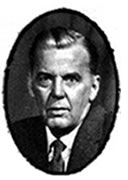 The Minister for Posts was the Honourable Eric Kierans, an irrepressible jokester. He was seated in his place as Macquarrie rose to address the almost vacant Chamber.
The Minister for Posts was the Honourable Eric Kierans, an irrepressible jokester. He was seated in his place as Macquarrie rose to address the almost vacant Chamber.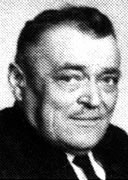 One of the few men who toiled in the backbenches of the P.C. Party, almost unnoticed, is one whose main claim to inclusion in this narrative is that he had been born in Ukraine. Many others whose birth places lay far from Canada have been elected to Parliament in the ensuing years. As a matter of fact, in the ever-changing mosaic that reflects the face of Canada, colour, creed, garb, and variations in accent are widely represented in the Commons of the 21st century. As time passes, this may become so common that it will be unworthy of notice.
One of the few men who toiled in the backbenches of the P.C. Party, almost unnoticed, is one whose main claim to inclusion in this narrative is that he had been born in Ukraine. Many others whose birth places lay far from Canada have been elected to Parliament in the ensuing years. As a matter of fact, in the ever-changing mosaic that reflects the face of Canada, colour, creed, garb, and variations in accent are widely represented in the Commons of the 21st century. As time passes, this may become so common that it will be unworthy of notice.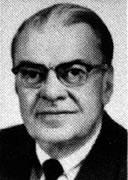 The Martin family's political story is by now well-known throughout Canada. It was my privilege to report both father and son when I served with Hansard, and I base my observations on their performances as members of that very select club, the House of Commons.
The Martin family's political story is by now well-known throughout Canada. It was my privilege to report both father and son when I served with Hansard, and I base my observations on their performances as members of that very select club, the House of Commons.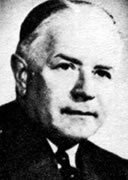 Linked inextricably in memory's eye with Paul Martin senior is the Honourable Lionel Chevrier. Both were born in the same year, 1903. Both were stalwarts of the Liberal Party. Both were called to the Cabinet in 1947. Both served as Canadian High Commissioner in London after the termination of their political lives.
Linked inextricably in memory's eye with Paul Martin senior is the Honourable Lionel Chevrier. Both were born in the same year, 1903. Both were stalwarts of the Liberal Party. Both were called to the Cabinet in 1947. Both served as Canadian High Commissioner in London after the termination of their political lives.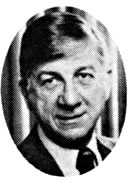 During his thirty years as Member of Parliament the Honourable Erik Nielsen carved out a remarkable career of many firsts, and few lasts. To begin with, he represented Yukon Territory, a name conjuring up tales of the midnight sun, men struggling against nature through the Whitehorse Pass on their way to the Klondike gold fields, and of the writers Jack London and Robert Service.
During his thirty years as Member of Parliament the Honourable Erik Nielsen carved out a remarkable career of many firsts, and few lasts. To begin with, he represented Yukon Territory, a name conjuring up tales of the midnight sun, men struggling against nature through the Whitehorse Pass on their way to the Klondike gold fields, and of the writers Jack London and Robert Service.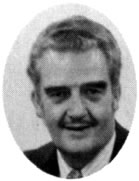
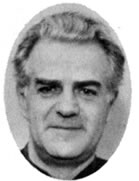
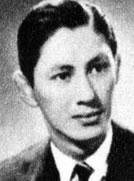 Ethnic representation in the Canadian House of Commons reflecting the growing diverse nature of immigration from countries world-wide began with a few nervous steps taken by the government led by the Right Hon. John George Diefenbaker in the late 1950s.
Ethnic representation in the Canadian House of Commons reflecting the growing diverse nature of immigration from countries world-wide began with a few nervous steps taken by the government led by the Right Hon. John George Diefenbaker in the late 1950s.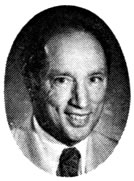 Pierre Elliot Trudeau succeeded Pearson as Prime Minister. Had it not been for Pearson, Trudeau might have remained a remote figure on the fringes of Québec politics, an academic destined to argue philosophically about democracy and human rights within a narrow circle of friends, free from the responsibility of taking any active part, save that of critic, and as participant in events surrounding a much publicised strike by asbestos strikers in that province.
Pierre Elliot Trudeau succeeded Pearson as Prime Minister. Had it not been for Pearson, Trudeau might have remained a remote figure on the fringes of Québec politics, an academic destined to argue philosophically about democracy and human rights within a narrow circle of friends, free from the responsibility of taking any active part, save that of critic, and as participant in events surrounding a much publicised strike by asbestos strikers in that province.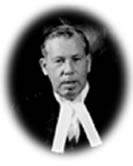 A more settled atmosphere in the Commons was experienced by Marcel Lambert's successor, the Honourable Alan B. Macnaughton, during the two and a half years from May 16 1963 to January 1 1965.
A more settled atmosphere in the Commons was experienced by Marcel Lambert's successor, the Honourable Alan B. Macnaughton, during the two and a half years from May 16 1963 to January 1 1965. 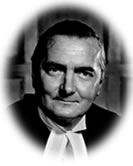 The Honourable Lucien Lamoureux is the man who set the standard for all who succeeded him as Speaker right through to the present day, and possibly for many more Parliaments to come. Born in Ottawa, he qualified as a barrister and entered Parliament as a neophyte backbencher following the General Election of 1962. He held the post of Deputy Speaker for more than two years when Macnaughton was Speaker, and went on to be selected Speaker on January 18, 1966. He held that post for the next eight years and nine months.
The Honourable Lucien Lamoureux is the man who set the standard for all who succeeded him as Speaker right through to the present day, and possibly for many more Parliaments to come. Born in Ottawa, he qualified as a barrister and entered Parliament as a neophyte backbencher following the General Election of 1962. He held the post of Deputy Speaker for more than two years when Macnaughton was Speaker, and went on to be selected Speaker on January 18, 1966. He held that post for the next eight years and nine months.